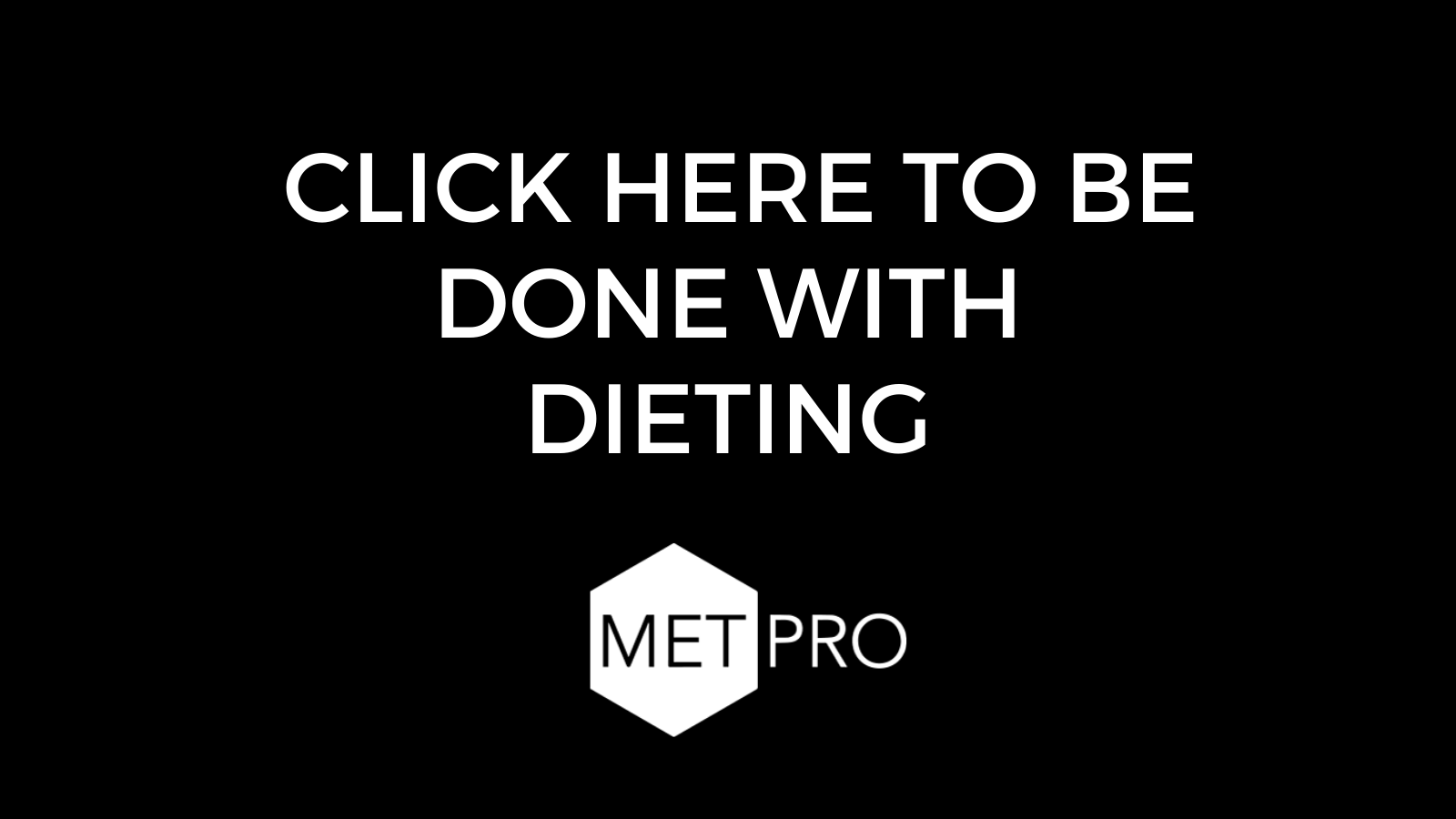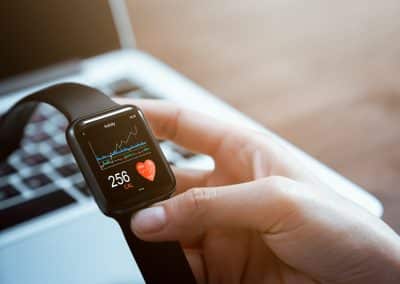I'm joined by the Founder of MetPro, Angelo Poli. We will be discussing exactly what MetPro is all about. Angelo, thank you so much for joining me.
It's great to be here, Crystal.
I want to start with, what exactly is MetPro?
Let's start from the beginning. Some might be surprised to find that MetPro is a periodized sports nutrition cycling approach. It was originally developed for high-performing athletes. It so happens that the same science that helps athletes perform their best and fuel for higher levels of athletic performance can also be tuned for weight loss, which we know 85% to 90% of people coming through our program for coaching, that's their primary goal. It's sports periodization.
How is MetPro different from other plans that are out there?
MetPro is very different. It is not a diet plan. Most people when they’re thinking of weight loss, we're thinking of a diet, “You're going to eat this for breakfast and that for lunch.” If you are working with one of our coaches, you will be put on a meal plan, but there's nothing special about any meal plan. Nobody owns a meal plan. Nobody owns those foods. Every meal plan out there has already been tried, thought about, worked and reworked.
What we do at MetPro is evaluate someone's metabolism against a baseline of intake. With that foundation, what it allows us to do is get hyper-specific with what a person needs for the next steps, whether it be weight loss or athletic performance. It takes a little bit of effort and a little bit more specificity than your run of the mill, eat less calories or avoid fried foods approach, but the payoff is worth it, especially if you want sustainable results.
Since it is so specific and it is a little different from what people are used to, how can people know if MetPro is a good choice for them?
Let's dive into basically what the starting experience is. Our coaches are going to work very closely with an individual using diet progressions. When most people think of a diet, they think of MyFitnessPal, which is based on this activity and my height and weight, this is how many calories I eat. There's the meal plan or they read a diet book that says, If you’re ectomorph, you eat this many calories.
What we have found is everyone needs something different, and we don't know what that is, just like you don't know what that is until we test and evaluate, and then we don't have to guess anymore. What that means is we'll have diet progressions. Our sports nutritionists and dieticians built out hundreds, nearly thousands of progressions.
Here's what that means. Think of a progression as you have a version 1 and a version 10 with the same diet. In other words, we have progressions that are built around eating three simple meals a day, 4 meals a day, 5 meals a day, 6 meals a day, and more. We have meal progressions that are ideal for people who prefer plant-based or plant-heavy diets. We have meal progressions that seem to work better for tricky schedules and travels.
Think of all these different meal progressions as categories we've identified with working with thousands of people over the years as common templates that work under certain circumstances. Within that template, what you have is a progression. A progression could be 8, 10, 15 or even 20-meal progressions. To simplify, let's say meal plan 10 is the highest. That's your lead athlete, your Olympian, or your competitive powerlifter, Crossfitter or endurance athlete. Every meal is very calorie-dense but it fits into one of the meal progression templates. That would be a phase 10.
A phase 9 would be that same meal template but retuned to be about 4% to 6% more restrictive. A phase 8 is another 4% to 6% more restrictive, down to phase 1 and phase 0, which you basically get a cup of tea. You don’t do that, but you see where we're going. I'm oversimplifying. When I'm saying, Tuned to be a little more restrictive,
there are a lot of dials and levers we're pulling and optimizing there.
In essence, that's what it boils down to. We do that because what we're trying to do is we no longer want to guess. That's for people who are trying this diet and trying that approach. It may work or it may not work. Unfortunately, the frustrating reality is sometimes even when it does work, it's hard to reproduce or they don't know exactly what's triggering that effect. With MetPro metabolic profiling, we're not going to guess. Your coach is going to get to know you and put you on a starting meal plan. It's going to be somewhere in the middle. Let's say a phase 5 or a phase 6.
Some people are going to be on progressions that have a little more protein than others. Some people do a little better with a little more fat in the mornings to stabilize their blood sugar. Roughly, you're going to be on a progression that we've had thousands of other people like you test into, follow for a few days, and categorize their results.
What we're going to do is have you do the same exact model. You're going to follow a simple meal plan, nothing fancy and nothing special. It will take a little bit of advanced prep, but follow a meal plan for 2 or 3 days, 72 hours seems to be about the sweet spot, and then we're going to have analytics on you that's going to say, You lost 2 pounds, or “You gain 2 pounds, or “You stayed the same weight,
whatever the case may be.
It's no longer guessing because we know that the meal plan you were following was split over a progression of five meals a day. Each meal has a glycaemic threshold of XYZ. Each meal, we know how many calories are in those meals. We know the macronutrient breakdown. We know exactly what you've been eating, and now we know exactly how your body has responded.
There's no more guesswork. It's very simple. At that point, our coaches are going to look and evaluate that data and say, Based on this, we’re going to drop you a phase or two phases,
or Increase you a phase,
or It’s working perfectly. Don’t change a thing.
The reason we work in meal progressions is because there is no diet that is perpetually going to force your body forward progressing.
I feel like that's something people don't understand. Let me dive in. Do you mean that if you do the same thing over and over again, no matter what it is, it's going to stop working eventually?
It's going to stop working. When I say working, your body must find homeostasis. In other words, you cannot survive in a perpetual state of weight gain or weight loss. Therefore, your body has to acclimate to your nutritional routine, whether that's eating five clean meals a day or that's eating one giant bucket of fried chicken at night. Your body will acclimate to whatever you do overtime for better or worse.
When it does acclimate, then you may still drift in a direction over the course of months and years, but rapid progress. You're not going to move rapidly in one direction or the other. That's why you hear a lot of people saying, I’m doing everything ‘right.’ Why aren’t I losing weight?
It's not that you're doing anything wrong. It's not that your diet is neither good nor bad, right nor wrong. It's that your metabolism that has acclimated and gotten used to what you're eating, therefore, something needs to change. It is full circle to what MetPro is. It's sports periodization.
Once your body gets used to something, we need to change it. We need to periodize that strategy. That way it's forced to get used to something different, and then change again and again. People tell me all the time, Angelo, I know that cutting carbs works or counting calories works.
You're right. All of those approaches work, but they're all going to stop working. Which lever are we going to pull? If we know what you're eating, and I don't mean every meal every day, you're going to cheat. Trust me. People say, Angelo, I’m going to follow it.
I'm like, You’re going to cheat.
Everybody cheats.
That's not the idea. The idea is that if you're working with one of my coaches or with me, we're going to have a routine in place where it's Tuesday and nothing is going on. We know what you're having for breakfast, lunch and snacks. There may be some wiggle room on Saturday nights but Tuesday, we've got that locked. That's the fun of participating in a coaching program.
When we know what your general routine is, we don't have to guess. What it allows us to do is determine when it's time to make an adjustment. I'll give you a real common scenario. Will I lose weight? Some people want to lose weight. The answer is yes. I can't guarantee that the meal plans that trigger weight loss for you will deem sustainable, but we will lose weight.
Here's how we deal with that. Somebody starts and we identify them as having a very slow metabolism. Maybe they've already been dieting. Maybe for years, they've been restricting calories, cutting carbs, not eating at certain times of the day, or whatever the case may be. They've already been in a dieting scenario. If we identify that the current intake, middle-range meal plan is not triggering weight loss, we're going to quickly drop you a phase lower drop and keep doing that until we lose weight.
Once we observe some weight coming off, we now have a threshold of, Here’s the line that triggers weight loss for Johnny, Bobby or Sue,
but if we look at that and evaluate that that's too low to sustain, then we can't stay there. We have to recondition your metabolic rate faster. That's where now having progressions that have many micro-steps is magical.
You've heard that you have to eat more to rev your metabolism and that is a true thing, but it's one of those approaches where it's like, Don’t try this at home,
because it's easy to miss. You do have to eat more to rev your metabolism, but you need to take a calculated approach because everybody does that. They go and get sick of dieting, and so they have a cheeseburger and a slice of chocolate cake. It does indeed rev their metabolism but it revs their waistline too.
It's a balance.
Nobody goes, Let’s see, I’ve been dieting now for five weeks, I hit my first plateau. I’m going to add a quarter cup of green beans and a few slices of sweet potato extra.
Nobody comes to that conclusion. That's not how the process works. That's the beauty of having an expert there that's getting on the phone with you, walking through the analytics and saying, Here’s what I see. You’re on this intake level. What I’m expecting is you to be down to this weight. I expect you to be down weight by this time. If we’re not there, here’s exactly what we’re going to do next.
They're also going to be there to calm you down and explain, You haven’t done anything wrong. This is your body doing what we would expect it to do as it gets used to this intake level. Here’s how much we’re going to increase. Here’s how long we’re going to increase for, and what you can expect when we drop you back down.
Here's the secret. Weight loss, weight gain or body recomping is all about contrast. I say weight loss because that's what most people are interested in hearing about. Weight loss is not about the right diet. There is no right diet. If so, I would have one meal plan in my CRM, instead of hundreds and hundreds for each circumstance. Weight loss is about contrast. It happens during the amount of time it takes your metabolism to acclimate to its new environment.
Let's put that into perspective. Somebody who's eating 2,500 calories a day will likely lose weight when they switch to eating 2,000 calories a day. They will lose weight for a period of time until their metabolism acclimates to that 2,000 calorie a day intake level. Some people have what we consider a fast metabolism, which means your body fights acclimating. It takes longer to acclimate.
They can lose weight with that small adjustment for weeks, maybe even a couple of months. Other people have a more naturally slower metabolism. That means they simply adapt faster. They can adapt to stay alive at that lower intake quicker. That person may lose weight for 5 or 6 days and their body is like, I’m good. I’m out.
I know people are going, Yes, that’s me.
The way you described it, it sounds like it's a good thing, but it's not a good thing.
It's a great thing if you're stranded on a desert island.
That's fair.
You're the survivors of the war. When you're trying to trim down, it can be very frustrating and it's not fair. Obviously, there's no magic wand, but this process is so difficult when you're shooting in the dark and guessing. We have to have analytics. That's what we do at MetPro. We're tracking all those analytics so we know, Your body is going to give us some more weight loss at this intake,
or No, you’re likely to plateau level off here. Here’s how we’re going to rev.
The principle isn't new. This is the same principle that bodybuilders use. I don’t want to be a bodybuilder.
That's okay. We can still benefit from the same science. What physique athletes will do is during the off-season, their goal is to gain muscle, therefore, they rev their metabolism by eating more calories. For years, I would take athletes to competitions and someone would always come up to me and say, Mr. Poli, what are you doing? Your athletes look amazing. What’s the secret?
I would give the tongue and cheek answer, It was boiled chicken, brown rice, broccoli or whatever if you prefer your veggie burgers.
They say, If I ate like them, will I look like that?
Probably not.
I'm just being honest.
Let me explain why. The reason why the boiled chicken and the broccoli incinerated body fat off of their frame was not because of boiled chicken and broccoli. Going back to that progression analogy, it was because they were used to eating a phase 5 and we increased them to a phase 6 and step with their increased training. They were able to maintain that level without gaining weight. We increased them to a phase 7, 8, 9 and then 10. By the way, there are way more than ten phases, but you see where we're going with this.
It’s not all at once. That's a quick way to put on body fat. As your body tolerates it, we're able to gradually watch your analytics, figure out when we can increase more, and get their metabolic rate up to burning 3,000, 4,000 or even 5,000 calories a day in some cases for some of my high performing athletes. What do you think happens when we then cut them down to 1,900 calories of boiled chicken and broccoli?
It melts off because they're still burning.
There's so much contrast. That's why it seems like it's not fair because a lot of people are calling us up saying, Help me figure this out. I’ve tried this and that, and I’m still not losing any more weight. When I cut out all my calories or I cut out all my carbs or I do this, I lose 2 pounds, and then nothing.
Why? It's because that person is used to eating very carefully. They're eating their 1,400 calories a day already, and then they go on a diet, and now they're eating 1,200. The contrast isn't there. It's so marginal that the body is like, I’m good with this. I’m not impressed.
That's why we have this system of analyzing and adjusting. The truth is if I had to put a percentage on it, most people lose weight easily when they get on a clean eating meal plan that's within a reasonable caloric or carbohydrate intake, or whatever lever we're using in carbs, calories and timing. All of it works. We use all of those tools. We're not a one-trick pony. Our coaches are going to use whatever tool has the most for that person.
For example, if you come to us already eating very low carbs, you're going to ask us why aren't we cutting carbs. It's not because carb restriction doesn't work. It's because you've already used that carb. There's no more contrast to be had there. We have to use another tool. That's what metabolic profiling allows us to do.
We figure out where someone is at. A basic clean eating protocol is usually more than enough to get someone significantly on their way to the health, the body weight, the physique, the performance they want, or whatever the goal. We now have the whole other side of the equation.
That is there's the science and there's knowing what to do, but then there's the follow-through.
There's doing it.
If you were a fly on the wall listening to one of my conversations in the first week or so, maybe two weeks with one of my clients, I'll tell you what I would hear. I'm on the phone with the client. You lost weight. Good. Did you prepare your meals? Did you get into a routine? Did you get the things dialed in like we talked? I know you lost weight. I don’t care.
I don't care if you lose 2 pounds or gain 2 pounds. What I care about is the routine. I've done this long enough to know that if I'm going to be able to impact a change that is meaningful and persists after 6 weeks, 8 weeks, 3 months or 6 months, it's all going to anchor to establishing a routine. That's what we're going to focus on first. I then have all my knobs and dials to make sure that your diet is where it's supposed to be, and your training. That all factors in. We make sure you exercise.
We're not wasting time with the wrong type of exercise. We're making it all work together like a finely tuned machine, but we have to have that routine in place. That's why time management, time-saving tools, food prep, cooking in bulk macros, and doing it in a way that's quick and easy for you are the key. It has to be sustainable. Those are all the tools that coaches work with their clients on because that's what's going to get someone results or the end game.
I'll often get hired to speak at some of these executive retreats or whatever these groups are where people ask me the question, Angelo, what’s the secret? I know who you are and who your company works with. How do you get people to transform?
They're expecting me to tell them the best exercise and the right foods to eat. They're surprised when I say the secret is time management. That's what it boils down to.
If you don't take the time to perfect your routine, then no matter what you're doing, you're not going to stay consistent with it.
Most people don't have a routine. I'll get up in front of the group and I'll say, How many people have a specific diet strategy that they find works for them?
About half the crowd will raise their hand and I'll say, Perfect. This side of the room is going to do the diet strategy. That side of the room is going to eat whatever they want. Here’s the catch. That side of the room has to prepare in advance everything they’re eating the next day. Which side of the room is going to lose more weight?
What did they say?
It's always the food prep group because we know if we were eating what we intended to or we were preparing and had a routine in place, a weight loss would be easy or a weight gain. Maybe you want to put on muscle, you want to increase performance, or whatever the case is. If you have a routine, it's so much easier. Getting into that routine can be a challenge, Where do I start?
People are shocked to find out which meals our coaches tell them to always have prepared in advance, and which meals never bother preparing in advance. You don't need to. They're usually shocked to find those things out. They're usually shocked to find out which meals we say are the most important, why we snack, what types of snacks we want you to do, and how we want you to prepare those.
Some things may seem a little unorthodox, but it's for self-preservation. We've done this over so many years with so many clients that we've learned that the number one reason why someone falls off or fails to see the result they were desiring is not a mathematical equation or a science issue. It's not even a willpower issue. It's not even because of their love of chocolate. The number one reason is, I got busy and …
It never ends well.
Our experienced coaches, we circumvent that and we already assumed before you start day one that you're too busy and start implementing strategies, assuming that's the number one issue. That's where all the coaching comes in. The demographic of people that need that support to break through with strategies for their lifestyle.
There are people that are already in a good routine. They have their breakfast and lunch. There are always exceptions. You will cheat. They know generally what they're going to eat, but they don't have the analytics and the science saying, It’s time to rev your metabolism. It’s time to go into a cutting cycle and here’s how long it should last.
That's why we want to support people on both fronts.
That makes sense. I see why it's different from a typical diet plan. It's different from that. You're taking all of this data and you're using it to help people make changes on a regular basis to be able to continually change up what they're doing, so their body does not stay acclimated.
There's one more thing.
What's that?
We have fun doing it. We do because we're real people that have done this over and over again, and we work with real people. You have to have a sense of humor about things. You have to understand life happens. There are going to be challenges. It's never going to be perfect, but when you have someone that's in your corner, supporting you with very specific next steps, laying out the breadcrumb trail, not ambiguous direction. I'm presuming you know that eating high sugar or high fried diet is probably not the best thing, but actual specific actionable items that make a difference.
It absolutely does. The support and accountability are everything in my opinion. Angelo, is there anything else that you want to share with people about what MetPro is before we go?
Tell us your story and journey. We always invite people. That's how we learn. We learn by hearing the story and the journey of our clients. One of the first questions that our coaches ask our clients is, "Give me your diet history or diet culture.” We want to know what you've done and what the results have been. All of that stuff is going to inform our decisions and our approach with you. If you want to know more about what a program would look like for you, you can't necessarily tap someone else doing MetPro. You can get the basics, but the program they're on may not look anything like what your coach has you do.
Case in point, my husband and I are both on it, and it looks different for the two of us.
Indeed. I can confirm that.
Thank you so much for your time, Angelo. I appreciate it.
It's been a blast. Thanks for having me, Crystal.
That is all for this episode. You can find all of the MetPro Method episodes anywhere you get podcasts or you can go to MetPro.co/podcast. Be sure to follow the show and rate and review because that lets other people know what they can expect. You can also learn more about MetPro at MetPro.co. I will be back next time. Until then remember, consistency is key.






